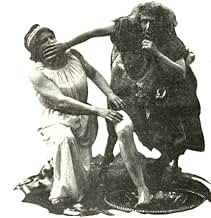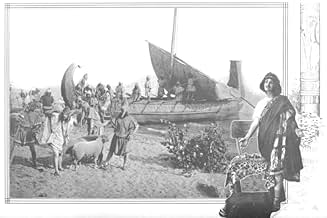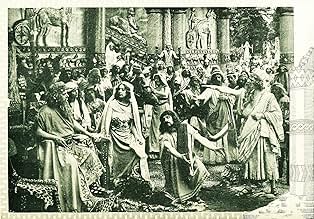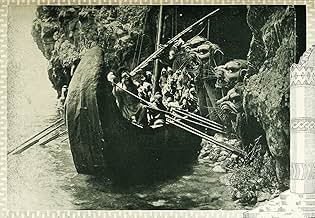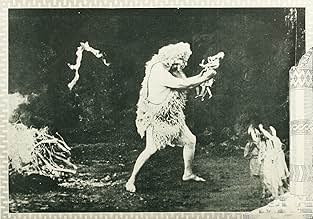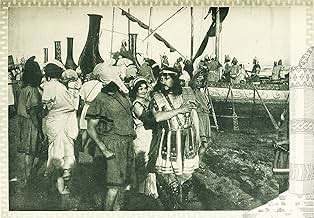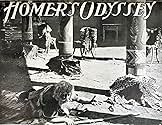Ajouter une intrigue dans votre langueFilm adaptation of Homer's 'The Odyssey.'Film adaptation of Homer's 'The Odyssey.'Film adaptation of Homer's 'The Odyssey.'
- Réalisation
- Scénario
- Casting principal
Avis à la une
An impressive early Italian epic telling the tale of Ulysses' arduous journey home after the taking of Troy and his vanquishing of his chunky wife's army of suitors. The acting is sometimes over the top, but the special effects are impressive for the era and the pacing is good.
At 44 minutes, this is a massive epic for 1911, and the production values, especially the set designs and decorations are great. There are some beautiful scenes in it, particularly the combination of split-screen photography and forced perspective used in the cave of Polyphemus, and the beauty and fine crowd direction of Alcinous' court. Unfortunately, there are three directors credited on this one. It's impossible to say who was responsible for what, although the cameraman, Emilio Roncarolo offers praiseworthy work.
The credits say the movie's look is based on drawings found in a library. If true, this means it's an evolutionary link to the modern practice of storyboarding, in which the shooting script is first converted into a sort of graphic novel to serve as a guide to the director. That, in turn, evokes the tableau vivant, a type of stage performance in which the performers reproduce a famous scene, painting or statuary group. The trick was to remain still, and this was often used for 19th-Century pornographic shows in which disrobed nymphs bathed. The details of British and American law in particular held that so long as no one moved, it was art, not dirty performances.
Because THE ODYSSEY is one of the foundational works of Western Art, it should come as no surprise that this is told using the Chapter Heading method, in which the audience is told what they are going to see, and then are shown it. Because of the strong adherence to those pictures (reportedly) found in a library, I found myself picking out moments, and realizing that moment was the picture they used. When they use such methods nowadays, usually in movie versions of Frank Miller, I find the splash panel moment, and it looks clumsy to me; films are not graphic novels. Here, though, when cinema was still very young, it's a clear attempt for workers in the field to find the best techniques.
The credits say the movie's look is based on drawings found in a library. If true, this means it's an evolutionary link to the modern practice of storyboarding, in which the shooting script is first converted into a sort of graphic novel to serve as a guide to the director. That, in turn, evokes the tableau vivant, a type of stage performance in which the performers reproduce a famous scene, painting or statuary group. The trick was to remain still, and this was often used for 19th-Century pornographic shows in which disrobed nymphs bathed. The details of British and American law in particular held that so long as no one moved, it was art, not dirty performances.
Because THE ODYSSEY is one of the foundational works of Western Art, it should come as no surprise that this is told using the Chapter Heading method, in which the audience is told what they are going to see, and then are shown it. Because of the strong adherence to those pictures (reportedly) found in a library, I found myself picking out moments, and realizing that moment was the picture they used. When they use such methods nowadays, usually in movie versions of Frank Miller, I find the splash panel moment, and it looks clumsy to me; films are not graphic novels. Here, though, when cinema was still very young, it's a clear attempt for workers in the field to find the best techniques.
An historic piece of film. You must forgive the primitive special effects which, for example, make the cyclops appear to be only eight feet tall. In its day it was probably considered an amazing film. The acting is silent-movie style overdone. The costumes and special effects are laughable. The film has been chopped down to only the barest of the original Homer story. As a high school English teacher, I show parts of this film to my class after we read Book 9 (the cyclops story). The class alternately howls and laughs at what they are watching. Nonetheless, movies like this set the stage for all the big extravaganzas that were to follow. If you want to preview this film, you can find snippets of this movie on several online sites.
I hardly think there's much arguing that compared to modern standards, early silent films appear simple and unsophisticated. The artifice of any given scene is more readily discernible; a renowned tale may well be abbreviated according to the limitations of a production (even more than modern viewers recognize with many modern adaptations); the division of a picture with the use of intertitles may serve to disrupt one's engagement from the proceedings, especially for those who are less accustomed to the stylings of the era. For all this, however, there's a great magic to such titles, if not tremendous grandeur, that just doesn't feel the same with all the advantages of technology and resources of major studios that developed over the past several decades. This is to say that despite their frailties, silent movies are special in a way that more recent fare can never hope to be. And so we have Milano Films' 1911 rendition of Homer's 'Odyssey,' a "full-length" feature (according to the rules of the Academy of Motion Picture Arts and Sciences) that at 44 minutes is considerably longer than a great many of its antecedents, and in some ways perhaps more complex.
Those ways in which the journey of Odysseus has been reduced are undeniable. More than would be true elsewhere and later in the 1910s and 20s as the medium progressed, advancement of the narrative is very plainspoken and rudimentary as intertitles relate the precise events that will follow in each subsequent depicted scene. There is no actual relation of dialogue, and no especial nuance in the portrayal here - just the biggest concrete beats, like one might see in a heavily illustrated storybook for young children. This is no knock against 'L'Odissea,' mind you; it's just a reflection of where cinema was at this stage in its growth, but I can understand why in the twenty-first century some audiences may not respond as well to flicks of so long past, particularly as it means that the scale of Homer's epic is not truly felt. For that matter, the visual presentation (effects, special makeup) is minimal, and basic by the standards of even just a few years hence.
And still, despite all this, it's hard not to be impressed with what Milano achieved here. We can yet admire the story as it's being told even in a diminished form, and marvel at how spectacular this must have seemed when the film first premiered. Though we can see the contrivance, that allows us to appreciate the craftsmanship all the more. The costume design is splendid, and there's no mistaking the labor poured into the production elsewhere behind the scenes: detailed sets, many creatures, the ship, a considerable number of extras. The editing is terrific, seeming perhaps a little advanced for 1911. Where depiction of certain events relies on a different tint for the physical frame, and or otherwise slight embellishments thereto, the result is less than wholly convincing, but I still appreciate the intent and the fundamental work.
Beyond those ways in which 'L'Odissea' streamlines the narrative (or "chops it up," if you're more cynical), I think what's most striking to me is how this compares to another picture that Milano made just earlier in the same year. 'L'Inferno,' adapting (the most famous part of) Dante Alighieri's seminal work to the big screen, even now remains a must-see, upstanding classic of rich, unsettling visuals and incredible storytelling. It almost seems odd that this feature should have followed that one, for it looks and feels less remarkable and far less polished, as if it had actually been made first. Again, I don't inherently mean this as a disparagement of this piece, only, the discrepancy is noteworthy, and underlines the modesty of the affair.
Unless you're a literature buff or already enamored of early cinema there's no major need to check this out, and even for such viewers it's clear that this comes from a more raw and less refined time in the history of the medium. Be all that as it may, this is a slice of movie history that is very much worth remembering and exploring. One hundred and twelve years later it may not be entirely captivating or essential, but to watch 'L'Odissea' is to step back in time and treasure the hard work that went into it, and it's still a trip worth taking.
Those ways in which the journey of Odysseus has been reduced are undeniable. More than would be true elsewhere and later in the 1910s and 20s as the medium progressed, advancement of the narrative is very plainspoken and rudimentary as intertitles relate the precise events that will follow in each subsequent depicted scene. There is no actual relation of dialogue, and no especial nuance in the portrayal here - just the biggest concrete beats, like one might see in a heavily illustrated storybook for young children. This is no knock against 'L'Odissea,' mind you; it's just a reflection of where cinema was at this stage in its growth, but I can understand why in the twenty-first century some audiences may not respond as well to flicks of so long past, particularly as it means that the scale of Homer's epic is not truly felt. For that matter, the visual presentation (effects, special makeup) is minimal, and basic by the standards of even just a few years hence.
And still, despite all this, it's hard not to be impressed with what Milano achieved here. We can yet admire the story as it's being told even in a diminished form, and marvel at how spectacular this must have seemed when the film first premiered. Though we can see the contrivance, that allows us to appreciate the craftsmanship all the more. The costume design is splendid, and there's no mistaking the labor poured into the production elsewhere behind the scenes: detailed sets, many creatures, the ship, a considerable number of extras. The editing is terrific, seeming perhaps a little advanced for 1911. Where depiction of certain events relies on a different tint for the physical frame, and or otherwise slight embellishments thereto, the result is less than wholly convincing, but I still appreciate the intent and the fundamental work.
Beyond those ways in which 'L'Odissea' streamlines the narrative (or "chops it up," if you're more cynical), I think what's most striking to me is how this compares to another picture that Milano made just earlier in the same year. 'L'Inferno,' adapting (the most famous part of) Dante Alighieri's seminal work to the big screen, even now remains a must-see, upstanding classic of rich, unsettling visuals and incredible storytelling. It almost seems odd that this feature should have followed that one, for it looks and feels less remarkable and far less polished, as if it had actually been made first. Again, I don't inherently mean this as a disparagement of this piece, only, the discrepancy is noteworthy, and underlines the modesty of the affair.
Unless you're a literature buff or already enamored of early cinema there's no major need to check this out, and even for such viewers it's clear that this comes from a more raw and less refined time in the history of the medium. Be all that as it may, this is a slice of movie history that is very much worth remembering and exploring. One hundred and twelve years later it may not be entirely captivating or essential, but to watch 'L'Odissea' is to step back in time and treasure the hard work that went into it, and it's still a trip worth taking.
Homer's Odyssey remains one of literature's most famous stories, to the point where the word refers to any epic journey. Probably the most well known adaptation to us in the 21st century is the Coen brothers' "O Brother, Where Art Thou?", which moves the action to Depression-era Mississippi. I recently saw a 1954 Italian adaptation called "Ulysses", starring Kirk Douglas in the title role. It turns out that the first ever big screen adaptation was this 40-minute Italian movie from 1911. We can forgive the archaic special effects in "L'odissea"; after all, cinema was in its infancy at the time. It's still a fun time. Available on YouTube (where the version has German intertitles).
Le saviez-vous
- ConnexionsReferenced in L'héritage de la chouette: Nostalgie ou Le retour impossible (1990)
Meilleurs choix
Connectez-vous pour évaluer et suivre la liste de favoris afin de recevoir des recommandations personnalisées
Détails
- Durée44 minutes
- Couleur
- Mixage
- Rapport de forme
- 4:3
Contribuer à cette page
Suggérer une modification ou ajouter du contenu manquant

Lacune principale
By what name was L'odyssée d'Homère (1911) officially released in Canada in English?
Répondre
